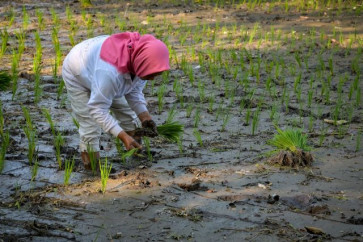Popular Reads
Top Results
Can't find what you're looking for?
View all search resultsPopular Reads
Top Results
Can't find what you're looking for?
View all search resultsGlobal rice price shock and food security in ASEAN
Addressing the impacts of food price volatility is in the best interest of most ASEAN countries and should be handled collectively.
Change text size
Gift Premium Articles
to Anyone
 Falling yield: A farmer plants rice seedlings on Oct. 10, 2023 at her paddy field in Mataram, West Nusa Tenggara. The Agriculture Ministry has projected a declining trend in rice production for the fourth quarter, from 2.34 million tonnes in September to 2.2 million tonnes in October, 1.65 million tonnes in November and 1.37 million tonnes in December. (Antara/Ahmad Subaidi)
Falling yield: A farmer plants rice seedlings on Oct. 10, 2023 at her paddy field in Mataram, West Nusa Tenggara. The Agriculture Ministry has projected a declining trend in rice production for the fourth quarter, from 2.34 million tonnes in September to 2.2 million tonnes in October, 1.65 million tonnes in November and 1.37 million tonnes in December. (Antara/Ahmad Subaidi)
A
SEAN, a region that heavily depends on rice as a crucial staple food, has grappled with fluctuations in global rice prices over the past month with prices rising steeply due to climate disruptions such as floods, heat waves and other extreme weather conditions.
All Rice Price Index of the Food and Agriculture Organization (FAO) reached 142.4 in August, marking a 31 percent increase from the previous year, driven by a global rice shortage and export restrictions imposed by India since July.
In Malaysia, locally produced rice has become scarce. Local rice production can only meet 70 percent of domestic demand. Currently, many supermarkets and small grocery stores often have empty shelves because 5 and 10-kilogram bags of local rice are quickly snapped up by customers as soon as new stock arrives.
This scarcity is attributed to the growing price disparity between locally produced rice and imported varieties. In Malaysia, local rice is a government-regulated food item with a price cap of 26 ringgit (US$5.54) per 10 kilograms. Imported rice had generally been more expensive than local rice, even before the recent global price hikes.
The Philippine government is also implementing the same policy by setting a price ceiling, the maximum allowable selling price for consumers. This policy establishes an upper limit of 41 pesos (72 cents) per kilogram for regular and 45 for well-milled rice. Undoubtedly, this policy also has the same implication: the occurrence of rice scarcity due to the price ceiling not being supported by a substantial rice reserve only exacerbates the shortages.
Indonesia faces the same difficulties due to the skyrocketing global rice prices. According to the National Strategic Food Price Information Center, the rice price in Jakarta increased by an average of Rp 130 (0.8 cents) per kg from Rp 14,550 per kg in the first week of August to Rp 15,200 per kg in the second week of September.
The purchase of subsidized rice branded-name (SPHP) rice is restricted to a maximum of two bags of SPHP rice, with each bag weighing 5 kg, in all modern retail outlets in Indonesia to prevent panic buying.


















